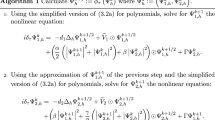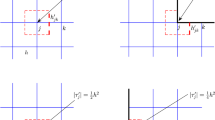Abstract
This paper is concerned with numerical analysis of a finite element method for the time-dependent Ginzburg–Landau equations under the Coulomb gauge. The main challenge is that the magnetic potential \({{\varvec{A}}}\) is divergence-free and satisfies a Stokes-like structure under the Coulomb gauge. The proposed method uses linear Lagrange element \({\mathcal {P}}_1\) to solve for the order parameter \(\psi \), the lowest order Nédélec edge element \(\mathcal {N}\! \mathcal {D}_{\! 1}\) and linear Lagrange element \({P}_1\) to approximate the magnetic potential \({{\varvec{A}}}\) and the electric potential \(\phi \), respectively. In particular, the proposed method preserves a weakly divergence-free property for \({{\varvec{A}}}\) in the discrete level. The main aim of this work is to establish the second order spatial convergence of the most important variable \(\psi \), though the numerical solutions of \({{\varvec{A}}}\) are only O(h) in space. Our analysis is based on a nonstandard quasi-projection for \(\psi \) and the corresponding \(H^{-1}\)-norm estimates for Maxwell projection. With the quasi-projection, we prove that the lower-order approximation to \({{\varvec{A}}}\) does not pollute the accuracy of \(\psi _h\). An effective one step recovery is also proposed to obtain second order numerical solution for \({{\varvec{A}}}\). Our numerical experiments confirm the optimal second order convergence of \(\psi _h\) and the efficiency of the recovery step.





Similar content being viewed by others
Data Availability
The datasets generated during and/or analysed during the current study are available from the authors on reasonable request.
References
Alstrøm, T., Sørensen, M., Pedersen, N., Madsen, S.: Magnetic flux lines in complex geometry type-II superconductors studied by the time dependent Ginzburg-Landau equation. Acta Appl. Math. 115, 63–74 (2011)
Arnold, D., Falk, R., Winther, R.: Finite element exterior calculus: from Hodge theory to numerical stability. Bull. Amer. Math. Soc. (N. S.) 47, 281–354 (2010)
Bethuel, F., Brezis, H., Heléin, F.: Ginzburg-Landau Vortices. Birkhäuser, Boston (1994)
Bochev, P., Lehoucq, R.: On the finite element solution of the pure Neumann problem. SIAM Rev. 47, 50–66 (2005)
Boffi, D., Brezzi, F., Fortin, M.: Mixed Finite Element Methods and Applications. Springer, Heidelberg (2013)
Carlson, J., Pack, A., Transtrum, M., Lee, J., Seidman, D., Liarte, D., Sitaraman, N., Senanian, A., Kelley, M., Sethna, J., Arias, T., Posen, S.: Analysis of magnetic vortex dissipation in Sn-segregated boundaries in Nb\(_3\)Sn superconducting RF cavities. Phys. Rev. B 103, 024516 (2021)
Chen, Z., Hoffmann, K., Liang, J.: On a non-stationary Ginzburg-Landau superconductivity model. Math. Methods Appl. Sci. 16, 855–875 (1993)
Chen, Z., Hoffmann, K.: Numerical studies of a non-stationary Ginzburg-Landau model for superconductivity. Adv. Math. Sci. Appl. 5, 363–389 (1995)
Chen, Z.: Mixed finite element methods for a dynamical Ginzburg-Landau model in superconductivity. Numer. Math. 76, 323–353 (1997)
Dauge, M.: Elliptic Boundary Value Problems on Corner Domains, Lecture Notes in Math, vol. 1341. Springer, Berlin (1988)
Du, Q., Gunzburger, M., Peterson, J.: Analysis and approximation of the Ginzburg-Landau model of superconductivity. SIAM Rev. 34, 54–81 (1992)
Du, Q.: Global existence and uniqueness of solutions of the time-dependent Ginzburg-Landau model for superconductivity. Appl. Anal. 53, 1–17 (1994)
Duan, H., Li, S., Tan, R., Zheng, W.: A delta-regularization finite element method for a double curl problem with divergence-free constraint. SIAM J. Numer. Anal. 50, 3208–3230 (2012)
Duan, H., Ma, J., Zou, J.: Mixed finite element method with Gauss’s law enforced for the Maxwell eigenproblem. SIAM J. Sci. Comput. 43, A3677–A3712 (2021)
Duan, H., Zhang, Q.: Residual-based a posteriori error estimates for the time-dependent Ginzburg-Landau equations of superconductivity. J. Sci. Comput. 93, 1–47 (2022)
Ern, A., Guermond, J.: Theory and practice of finite elements. Applied Mathematical Sciences. Springer-Verlag, New York (2004)
Girault, V., Raviart, P.: Finite Element Methods for Navier-Stokes Equations. Springer-Verlag, Berlin (1986)
Gropp, W., Kaper, H., Leaf, G., Levine, D., Palumbo, M., Vinokur, V.: Numerical simulation of vortex dynamics in type-II superconductors. J. Comput. Phys. 123, 254–266 (1996)
Gao, H., Li, B., Sun, W.: Optimal error estimates of linearized Crank-Nicolson Galerkin FEMs for the time-dependent Ginzburg-Landau equations in superconductivity. SIAM J. Numer. Anal. 52, 1183–1202 (2014)
Gao, H., Sun, W.: An efficient fully linearized semi-implicit Galerkin-mixed FEM for the dynamical Ginzburg-Landau equations of superconductivity. J. Comput. Phys. 294, 329–345 (2015)
Gao, H., Sun, W.: A new mixed formulation and efficient numerical solution of Ginzburg-Landau equations under the temporal gauge. SIAM J. Sci. Comput. 38, A1339–A1357 (2016)
Gao, H., Sun, W.: Analysis of linearized Galerkin-mixed FEMs for the time-dependent Ginzburg-Landau equations of superconductivity. Adv. Comput. Math. 44, 923–949 (2018)
Gao, H., Sun, W.: Optimal analysis of non-uniform Galerkin-mixed finite element approximations to the Ginzburg-Landau equations in superconductivity. SIAM J. Numer. Anal. 61, 929–951 (2023)
Gor’kov, L., Éliashberg, G.: Generalization of the Ginzburg-Landau equations for non-stationary problems in the case of alloys with paramagnetic impurities. Sov. Phys. JETP 27, 328–334 (1968)
Gunter, D., Kaper, H., Leaf, G.: Implicit integration of the time-dependent Ginzburg-Landau equations of superconductivity. SIAM J. Sci. Comput. 23, 1943–1958 (2002)
Guo, B., Yuan, G.: Cauchy problem for the Ginzburg-Landau equation for the superconductivity model. Proc. Roy. Soc. Edinburgh Sect. A 127, 1181–1192 (1997)
Hiptmair, R.: Finite elements in computational electromagnetism. Acta Numer. 11, 237–339 (2002)
Hong, Q., Ma, L., Xu, J., Chen, L.: An efficient iterative method for dynamical Ginzburg-Landau equations. J. Comput. Phys. 474, 111794 (2023)
Li, B., Zhang, Z.: A new approach for numerical simulation of the time-dependent Ginzburg-Landau equations. J. Comput. Phys. 303, 238–250 (2015)
Li, B.: Convergence of a decoupled mixed FEM for the dynamic Ginzburg-Landau equations in nonsmooth domains with incompatible initial data. Calcolo 54, 1441–1480 (2017)
Li, B., Zhang, Z.: Mathematical and numerical analysis of the time-dependent Ginzburg-Landau equations in nonconvex polygons based on Hodge decomposition. Math. Comp. 86, 1579–1608 (2017)
Li, B., Yang, C.: Global well-posedness of the time-dependent Ginzburg-Landau superconductivity model in curved polyhedra. J. Math. Anal. Appl. 451, 102–116 (2017)
Li, B., Wang, K., Zhang, Z.: A Hodge decomposition method for dynamic Ginzburg-Landau equations in nonsmooth domains - a second approach, Commun. Comput. Phys. 28, 768–802 (2020)
Logg, A., Mardal, K., Wells, G. (eds.): Automated Solution of Differential Equations by the Finite Element Method. Springer, Berlin (2012)
Mu, M.: A linearized Crank-Nicolson-Galerkin method for the Ginzburg-Landau model. SIAM J. Sci. Comput. 18, 1028–1039 (1997)
Mu, M., Huang, Y.: An alternating Crank-Nicolson method for decoupling the Ginzburg-Landau equations. SIAM J. Numer. Anal. 35, 1740–1761 (1998)
Monk, P.: Finite Element Methods for Maxwell’s Equations. Oxford University Press, New York (2003)
Pack, A., Carlson, J., Wadsworth, S., Transtrum, M.: Vortex nucleation in superconductors within time-dependent Ginzburg-Landau theory in two and three dimensions: Role of surface defects and material inhomogeneities. Phys. Rev. B 101, 144504 (2020)
Qiu, W., Shi, K.: A mixed DG method and an HDG method for incompressible magnetohydrodynamics. IMA J. Numer. Anal. 40, 1356–1389 (2020)
Richardson, W., Pardhanani, A., Carey, G., Ardelea, A.: Numerical effects in the simulation of Ginzburg-Landau models for superconductivity. Int. J. Numer. Meth. Engng. 59, 1251–1272 (2004)
Tang, Q., Wang, S.: Time dependent Ginzburg-Landau equations of superconductivity. Phys. D 88, 139–166 (1995)
Winiecki, T., Adams, C.: A fast semi-implicit finite-difference method for the TDGL equation. J. Comput. Phys. 179, 127–139 (2002)
Wu, C., Sun, W.: Analysis of Galerkin FEMs for mixed formulation of time-dependent Ginzburg-Landau equations under temporal gauge. SIAM J. Numer. Anal. 56, 1291–1312 (2018)
Acknowledgements
The authors wish to thank the anonymous referees for many constructive comments that improved the paper.
Funding
This work is partially supported by National Natural Science Foundation of China under Grant Number 12231003.
Author information
Authors and Affiliations
Contributions
HG and WX have participated sufficiently in the work to take public responsibility for the content, including participation in the concept, method, analysis and writing. All authors certify that this material or similar material has not been and will not be submitted to or published in any other publication.
Corresponding author
Ethics declarations
Conflict of interest
All the authors declared that they have no conflict of interest.
Additional information
Publisher's Note
Springer Nature remains neutral with regard to jurisdictional claims in published maps and institutional affiliations.
Rights and permissions
Springer Nature or its licensor (e.g. a society or other partner) holds exclusive rights to this article under a publishing agreement with the author(s) or other rightsholder(s); author self-archiving of the accepted manuscript version of this article is solely governed by the terms of such publishing agreement and applicable law.
About this article
Cite this article
Gao, H., Xie, W. A Finite Element Method for the Dynamical Ginzburg–Landau Equations under Coulomb Gauge. J Sci Comput 97, 19 (2023). https://doi.org/10.1007/s10915-023-02327-x
Received:
Revised:
Accepted:
Published:
DOI: https://doi.org/10.1007/s10915-023-02327-x




